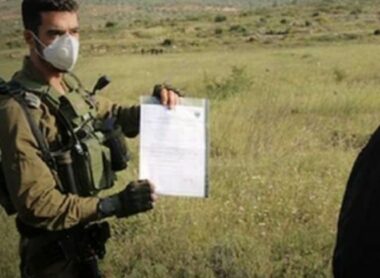Israeli occupation authorities imposed, on Wednesday, stop-work orders for five Palestinian-owned structures in Marda village, north of Salfit in the northern West Bank, according to a local official.
Murad Khuffash, the head of the Marda village council, told the Palestinian News & Information Agency (WAFA) that occupation soldiers stormed the village to deliver stop-work orders to a number of Palestinian residents, under the pretext of being built in “Area C”.
The notices targeted an under-construction mosque, three houses, and a shop, and will also include an agricultural road that which will render farmers unable to reach their farmlands.
After the Oslo Accords were signed in 1995, the occupied West Bank was divided into Areas A, B, and C. “Area C” comprises about 60% of the occupied West Bank, and is under full Israeli civil and military control.
Meanwhile, also in the northern West Bank, Israeli soldiers compelled, on Wednesday, Palestinian store owners to close their shops in Huwwara village, south of Nablus, according to a local activist.
Awwad Nijem, a Palestinian activist, told WAFA that Israeli troops fired concussion grenades at the Palestinian-owned shops forcing the to close.
The closure was imposed under the pretext that some local Palestinians had allegedly thrown stones at illegal settler cars in the area.
The move is an act of collective punishment aimed at negatively affecting the livelihoods of the indigenous Palestinian population, aimed at forcing them out of their land.
Collective punishment is prohibited under International Law as shown in Article 33 of the Fourth Geneva Convention, as stated below.
1. No protected person may be punished for an offence he or she has not personally committed. Collective penalties and likewise all measures of intimidation or of terrorism are prohibited.
2. Pillage is prohibited.
3. Reprisals against protected persons and their property are prohibited.

